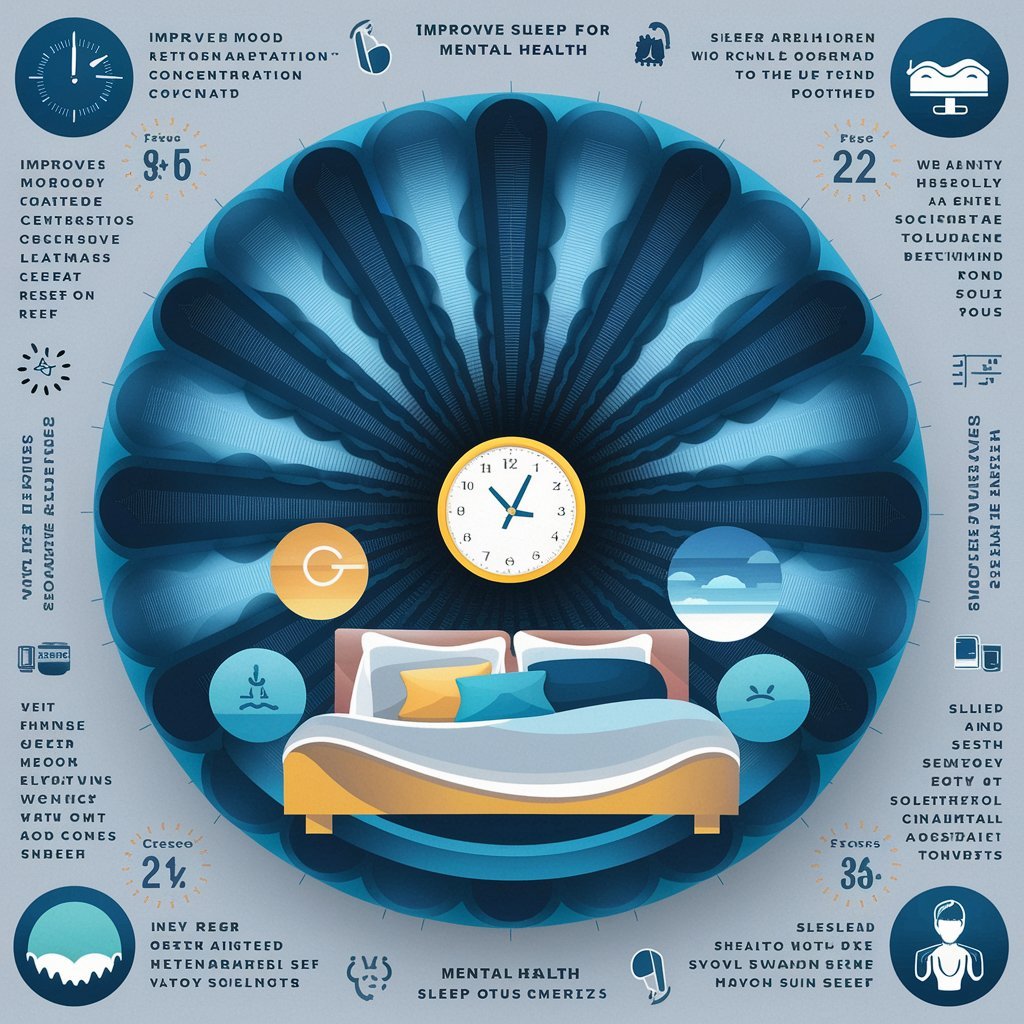The Impact of Sleep on Mental Health: Importance of Quality Rest
Hey there, my young and sleepy friends! It’s your favorite mental health buddy, Nita Sharda, here to talk about a topic that’s super important for our overall well-being – the impact of sleep on mental health.
Now, I know that when we’re young, sleep can sometimes feel like a bit of a drag. There’s so much excitement and adventure to be had in the world, and who wants to waste time snoozing when you could be out there living your best life?
But here’s the thing – sleep is not a waste of time. In fact, it’s one of the most important things we can do for our mental and physical health. It’s like giving our bodies and minds a big, cozy hug every night, and helping us recharge and refresh for all the awesomeness ahead.
So today, we’re going to dive deep into the wonderful world of sleep, and explore all the ways that quality rest can help us feel our best, both inside and out.
Why Sleep Matters for Mental Health
First things first, let’s talk about why sleep is so important for our mental health. When we sleep, our brains and bodies are hard at work, doing all sorts of important things to keep us healthy and happy.
Sleep Helps Us Process and Regulate Emotions
One of the biggest ways that sleep impacts our mental health is by helping us process and regulate our emotions.
During the day, we encounter all sorts of situations and experiences that can trigger different emotions – happiness, sadness, anger, fear, and everything in between.
When we sleep, our brains have a chance to sort through and make sense of all those emotions, and to file them away in a way that helps us feel more balanced and in control.
Studies have shown that people who get enough quality sleep are better able to regulate their emotions, and are less likely to experience mood swings, irritability, or emotional outbursts.
On the other hand, when we don’t get enough sleep, our brains have a harder time processing and regulating emotions, which can lead to feelings of anxiety, depression, or overwhelm.
Sleep Boosts Cognitive Function and Memory
Another way that sleep impacts our mental health is by boosting our cognitive function and memory.

When we sleep, our brains are busy consolidating and storing all the information and experiences we’ve had during the day.
This process helps us form new neural connections and strengthen existing ones, which can improve our ability to learn, remember, and think creatively.
Studies have shown that people who get enough quality sleep perform better on tests of memory, attention, and problem-solving, and are better able to learn and retain new information.
On the flip side, when we don’t get enough sleep, our cognitive function can suffer. We may have a harder time focusing, remembering things, or thinking clearly, which can impact our performance at school, work, or in our daily lives.
Sleep Promotes Physical Health and Resilience
Of course, sleep isn’t just important for our mental health – it’s also crucial for our physical health and resilience.
When we sleep, our bodies have a chance to rest, repair, and recharge. This is when our cells regenerate, our muscles recover from exercise, and our immune systems get a boost to help us fight off illness and disease.
Studies have shown that people who get enough quality sleep are less likely to get sick, have a lower risk of chronic diseases like diabetes and heart disease, and recover faster from injury or illness.
On the other hand, when we don’t get enough sleep, our bodies can suffer. We may feel tired, sluggish, or run down, and be more susceptible to illness or injury.
The Consequences of Poor Sleep on Mental Health
So, what happens when we don’t get enough quality sleep? Unfortunately, the consequences can be pretty serious for our mental health.
Increased Risk of Mental Health Disorders
One of the biggest risks of poor sleep is an increased risk of developing mental health disorders like depression, anxiety, and bipolar disorder.
Studies have shown that people who consistently get less than six hours of sleep per night are at a higher risk for these conditions, and may experience more severe symptoms if they do develop them.
This is because sleep plays such a crucial role in regulating our emotions and cognitive function, and when we don’t get enough of it, our brains and bodies can start to struggle.
Impaired Emotional Regulation and Mood
Another consequence of poor sleep is impaired emotional regulation and mood.
When we’re sleep deprived, we may feel more irritable, anxious, or depressed, and have a harder time managing our emotions in healthy ways.
We may snap at our friends or family members, have a harder time coping with stress or challenges, or just generally feel “off” or not like ourselves.
Over time, this can take a serious toll on our relationships, our self-esteem, and our overall sense of well-being.
Decreased Cognitive Function and Performance
Finally, poor sleep can also lead to decreased cognitive function and performance.
When we’re tired, we may have a harder time focusing, remembering things, or thinking creatively. We may make more mistakes, take longer to complete tasks, or just generally feel like our brains are in a fog.
This can impact our performance at school or work, and make it harder for us to learn and grow in the ways we want to.
Tips for Getting Quality Sleep
Okay, so now that we know how important sleep is for our mental health, let’s talk about some tips for getting that quality rest we all need and deserve.
Stick to a Consistent Sleep Schedule
One of the most important things we can do for our sleep is to stick to a consistent sleep schedule.
This means going to bed and waking up at the same time every day, even on weekends or holidays.
Our bodies and brains thrive on routine, and having a consistent sleep schedule can help regulate our internal clocks and make it easier to fall asleep and wake up feeling refreshed.
Create a Relaxing Bedtime Routine
Another helpful tip is to create a relaxing bedtime routine that helps signal to our bodies and minds that it’s time to wind down and get ready for sleep.
This might include things like taking a warm bath, reading a book, listening to calming music, or doing some gentle stretches or yoga.
The key is to find activities that help us feel calm, relaxed, and ready for sleep, and to do them consistently each night.
Make Your Bedroom a Sleep-Friendly Environment
Our bedroom environment can also have a big impact on the quality of our sleep.
To create a sleep-friendly space, try to keep your bedroom cool, dark, and quiet. Invest in a comfortable mattress and pillows, and consider using blackout curtains or a white noise machine if needed.
It’s also a good idea to keep electronics like phones, tablets, and TVs out of the bedroom, as the blue light they emit can interfere with our natural sleep-wake cycles.
Limit Caffeine and Sugar Intake
What we eat and drink can also impact the quality of our sleep, so it’s important to be mindful of our intake, especially in the hours leading up to bedtime.
Caffeine and sugar are two big culprits when it comes to disrupting sleep, so try to limit your intake of coffee, soda, chocolate, and other sugary or caffeinated foods and drinks, especially in the afternoon and evening.
Instead, opt for water, herbal tea, or other calming beverages that can help promote relaxation and restful sleep.
Practice Stress-Reducing Activities
Finally, practicing stress-reducing activities throughout the day can also help improve the quality of our sleep at night.
This might include things like deep breathing, meditation, journaling, or spending time in nature.
The key is to find activities that help us feel calm, centered, and in control, and to make them a regular part of our daily routines.
The Importance of Prioritizing Sleep
At the end of the day, the most important thing we can do for our mental health and well-being is to prioritize sleep as a non-negotiable part of our lives.
I know that in our busy, fast-paced world, it can be tempting to skimp on sleep in favor of other activities or responsibilities. But the truth is, without quality rest, everything else in our lives suffers – our relationships, our work, our hobbies, and most importantly, our health and happiness.
So my challenge to you, my young friends, is to make sleep a top priority in your life. To treat it as the precious gift and powerful tool that it is, and to give yourself permission to rest, recharge, and dream big.
And if you ever find yourself struggling with sleep or feeling the impact of poor rest on your mental health, don’t hesitate to reach out for help and support. Talk to a trusted adult, like a parent, teacher, or counselor, or consider speaking with a mental health professional who can provide guidance and resources.
Remember, you are not alone, and there is no shame in seeking help when you need it. We all deserve to feel our best, both inside and out, and quality sleep is a crucial part













Leave a Reply